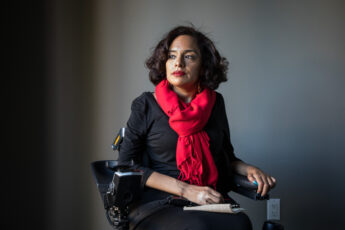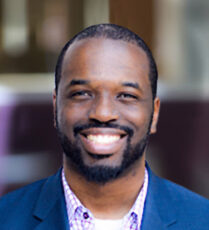
A week from today, Governor Newsom is expected to sign the 2023-2024 California state budget. In this program, we look at the deals that were struck and their impact on people with disabilities.
Then we widen our camera to talk about our yearly budget advocacy and how our community can become more powerful in this and other policy arenas.
Eric Harris, the director of Public Policy at Disability Rights California, breaks down how the state has chosen to invest its money for the next fiscal year.
Ligia Andrade Zúñiga, a member of the State Independent Living Council and trustee of the San Mateo Union High School District, discusses the budget’s problems as well as the stress of constantly advocating for services affecting people with disabilities – in particular women of color.
Zúñiga and Harris also bring us valuable tips on how to advocate effectively with policymakers on issues of importance to those with disabilities. (Scroll down for more information about these two amazing humans.)
- Funding programs for our community.
- How to win more and lose less.
- What individuals can do.
It’s all coming to your ears on Pushing Limits.
ANNOUNCEMENT
Disability Housing FAQ workshop
What’s the difference between a reasonable accommodation and reasonable modification?
I’ve experienced discrimination; what are my options?
Will having an emotional support animal affect my housing?
I need physical changes in my unit because of my disability. Do I have to pay for these modifications?
Discover the answers to these questions and more at our upcoming Disability Housing FAQ Workshop on June 29th, from 1:30 p.m. – 3:00 p.m. PST, presented by Disability Rights California, The Center for Independent Living, ECHO Fair Housing, and Bay Area Legal Aid.
Disability Rights California has gathered some of their most frequently asked questions, submitted to their Housing Helpdesk from disabled people all across the state of California, and these questions will provide the framework for an engaging workshop on all things fair housing, disability, accessibility, and accommodations!
Our Disability Housing FAQ Workshop will be a hybrid event, with options to join in-person at the Ed Roberts Campus at 3075 Adeline Street in Berkeley, California, or virtually via Zoom. To register to attend virtually click here, or by going to https://bit.ly/DisabilityHousingFAQ
*Note: presenters cannot give legal adviceASL and CART will be provided. If you have other reasonable accommodation requests, please submit them via our Zoom registration page or reach out to Emma Martin at [email protected] or 510-422-5085.
————————————–

Produced and hosted by Jacob Lesner-Buxton.
Voiced and edited by Adrienne Lauby
Eric Harris
Eric Harris was born in Berkeley, California and grew up in Sacramento. He was born with left congenital hip dislocation, which gave him nerve damage in his left leg, right foot and right ankle. He had a number of surgeries growing up. Mr. Harris played on the sheelchair basketball team from BORP to win the National Championship game. As a member of the Under 20 USA Wheelchair Basketball Team he won the international championship. He’s played wheelchair basketball with the Golden State Road Warriors and is one of the founding members of the Sacramento Rollin Kings.
While in college, Mr. Harris focused on public policy and worked for United States Representative Barbara Lee (CA) and Sacramento City Council member Allen Warren. He attended the University of Oregon School of Law and worked at the Democratic National Committee. He’s worked on general policy for the western region and disability policy throughout the country, interned at the American Association for People with Disabilities in Washington, D.C., worked for the California State NAACP. He started to work at Disability Rights California in 2019.
Mr. Harris has done community work with disability leaders, community members and elected officials throughout the country. He is a proud member of Phi Beta Sigma Fraternity, Inc. and attends Bayside Midtown Church in Sacramento, California. Mr. Harris is a member of the State Independent Living Council as a Governor Newsom appointee, and a board member of the Resources for Independent Living in Sacramento.
Ligia Andrade Zúñiga
Ligia Andrade Zuniga, MPA, is a disability rights advocate and leader focused on the empowerment of marginalized and underrepresented communities primarily women of color with disabilities. Being a first-generation Guatemalan American-woman of color, preserving cultural identity, while embracing intersection and interdependence is extremely important to her.
Ms Andrade Zuniga attended Notre Dame De Namur University in Belmont California and has worked in local government and nonprofit for over 15 years. In 2009 almost a year after graduating from graduate school Ligia sustained a spinal cord injury which opened the door to the disability community. She is a volunteer peer supporter through the Spinal Cord Injury Peer Support Program at Santa Clara Valley Medical Center where she rehabilitated. Ms Andrade Zuniga worked for the Silicon Valley Independent Living Center in the deinstitutionalization program where she learned about the Independent Living Movement.
Currently, she works as a Sexuality and Disability Educator and Advocate and is an elected trustee and vice president of the Board of Trustees of the San Mateo Union High School District.
Ms Andrade Zuniga is highly involved in civic engagement locally primarily influencing policy and regulation around individuals with disabilities. Groups she is affiliated with include; San Mateo County Commission on Disabilities, San Mateo County Public Authority Advisory Committee, San Mateo County Cal Medi Connect Committee, San Mateo County Health Commission, and Center for Independence of Individuals with Disabilities Board of Directors. Ms Andrade Zunigavalues the visibility of parents with disabilities and has made sure parents with disabilities are visible and taken into consideration through the school experience with their children.

